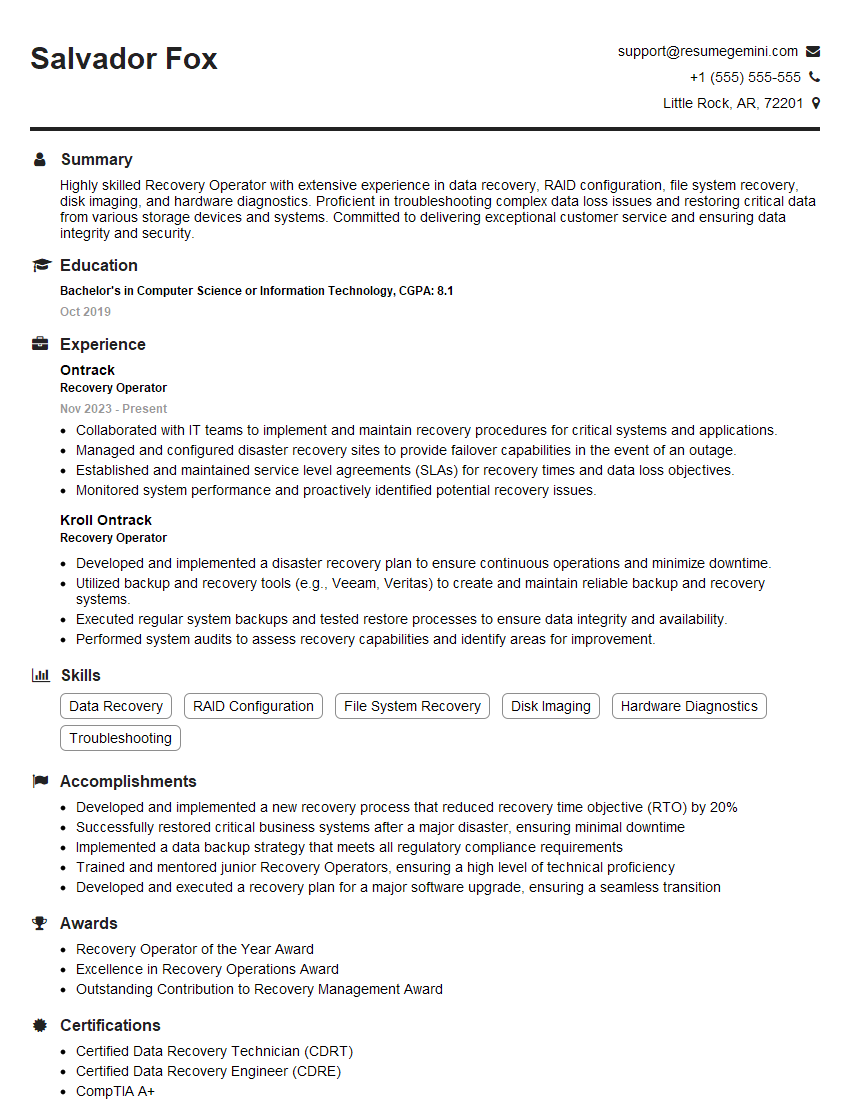Are you a seasoned Recovery Operator seeking a new career path? Discover our professionally built Recovery Operator Resume Template. This time-saving tool provides a solid foundation for your job search. Simply click “Edit Resume” to customize it with your unique experiences and achievements. Customize fonts and colors to match your personal style and increase your chances of landing your dream job. Explore more Resume Templates for additional options.

Salvador Fox
Recovery Operator
Summary
Highly skilled Recovery Operator with extensive experience in data recovery, RAID configuration, file system recovery, disk imaging, and hardware diagnostics. Proficient in troubleshooting complex data loss issues and restoring critical data from various storage devices and systems. Committed to delivering exceptional customer service and ensuring data integrity and security.
Education
Bachelor’s in Computer Science or Information Technology
October 2019
Skills
- Data Recovery
- RAID Configuration
- File System Recovery
- Disk Imaging
- Hardware Diagnostics
- Troubleshooting
Work Experience
Recovery Operator
- Collaborated with IT teams to implement and maintain recovery procedures for critical systems and applications.
- Managed and configured disaster recovery sites to provide failover capabilities in the event of an outage.
- Established and maintained service level agreements (SLAs) for recovery times and data loss objectives.
- Monitored system performance and proactively identified potential recovery issues.
Recovery Operator
- Developed and implemented a disaster recovery plan to ensure continuous operations and minimize downtime.
- Utilized backup and recovery tools (e.g., Veeam, Veritas) to create and maintain reliable backup and recovery systems.
- Executed regular system backups and tested restore processes to ensure data integrity and availability.
- Performed system audits to assess recovery capabilities and identify areas for improvement.
Accomplishments
- Developed and implemented a new recovery process that reduced recovery time objective (RTO) by 20%
- Successfully restored critical business systems after a major disaster, ensuring minimal downtime
- Implemented a data backup strategy that meets all regulatory compliance requirements
- Trained and mentored junior Recovery Operators, ensuring a high level of technical proficiency
- Developed and executed a recovery plan for a major software upgrade, ensuring a seamless transition
Awards
- Recovery Operator of the Year Award
- Excellence in Recovery Operations Award
- Outstanding Contribution to Recovery Management Award
Certificates
- Certified Data Recovery Technician (CDRT)
- Certified Data Recovery Engineer (CDRE)
- CompTIA A+
- CompTIA Network+
Career Expert Tips:
- Select the ideal resume template to showcase your professional experience effectively.
- Master the art of resume writing to highlight your unique qualifications and achievements.
- Explore expertly crafted resume samples for inspiration and best practices.
- Build your best resume for free this new year with ResumeGemini. Enjoy exclusive discounts on ATS optimized resume templates.
How To Write Resume For Recovery Operator
- Highlight your technical expertise in data recovery, file systems, and storage technologies.
- Showcase your experience in troubleshooting and resolving complex data loss issues.
- Quantify your accomplishments by providing specific examples of successful data recoveries.
- Emphasize your commitment to customer satisfaction and data security.
Essential Experience Highlights for a Strong Recovery Operator Resume
- Diagnose data loss issues and determine the cause of data failure, corruption, or inaccessibility
- Perform data recovery operations on various storage devices, including hard drives, SSDs, RAID arrays, and cloud storage
- Recover data from failed or damaged storage devices using advanced software and techniques
- Create disk images and perform forensic data analysis to retrieve deleted or lost data
- Troubleshoot and resolve hardware and software issues related to data storage and recovery
- Maintain and manage data recovery equipment and software to ensure optimal performance
- Provide technical support, guidance, and training to end-users on data recovery best practices
Frequently Asked Questions (FAQ’s) For Recovery Operator
What are the primary responsibilities of a Recovery Operator?
The primary responsibilities include diagnosing data loss issues, performing data recovery operations, creating disk images, troubleshooting hardware and software problems, maintaining data recovery equipment, and providing technical support to users.
What skills are essential for a successful Recovery Operator?
Essential skills include data recovery techniques, RAID configuration, file system recovery, disk imaging, hardware diagnostics, and troubleshooting abilities.
What industries commonly employ Recovery Operators?
Recovery Operators are employed in various industries, including data recovery companies, IT firms, government agencies, and healthcare organizations.
Is a college degree required to become a Recovery Operator?
While a college degree, such as a Bachelor’s in Computer Science or Information Technology, is preferred, some employers may consider candidates with equivalent experience and certifications.
What career advancement opportunities are available for Recovery Operators?
Recovery Operators can advance their careers by specializing in specific areas of data recovery, pursuing certifications, and taking on leadership roles.
How can I prepare for a career as a Recovery Operator?
To prepare, consider obtaining a relevant degree, gaining hands-on experience through internships or personal projects, and acquiring industry certifications.
What is the job outlook for Recovery Operators?
The job outlook for Recovery Operators is expected to remain strong as organizations continue to rely on data and require experts to recover lost or inaccessible information.